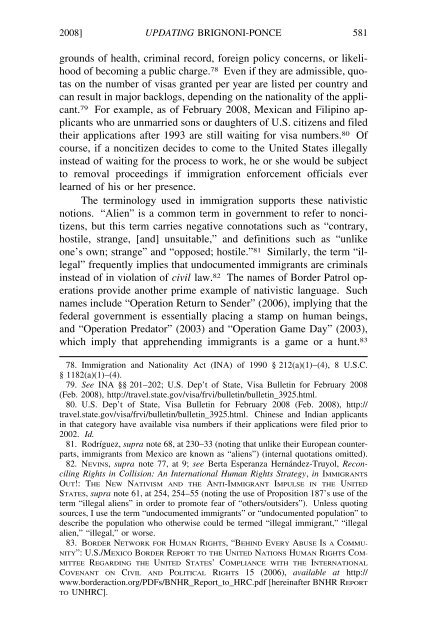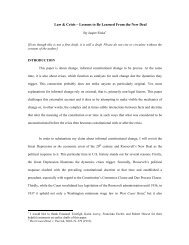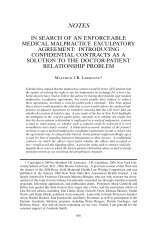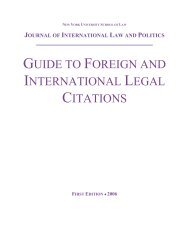updating brignoni-ponce - New York University School of Law
updating brignoni-ponce - New York University School of Law
updating brignoni-ponce - New York University School of Law
You also want an ePaper? Increase the reach of your titles
YUMPU automatically turns print PDFs into web optimized ePapers that Google loves.
2008] UPDATING BRIGNONI-PONCE 581<br />
grounds <strong>of</strong> health, criminal record, foreign policy concerns, or likelihood<br />
<strong>of</strong> becoming a public charge. 78 Even if they are admissible, quotas<br />
on the number <strong>of</strong> visas granted per year are listed per country and<br />
can result in major backlogs, depending on the nationality <strong>of</strong> the applicant.<br />
79 For example, as <strong>of</strong> February 2008, Mexican and Filipino applicants<br />
who are unmarried sons or daughters <strong>of</strong> U.S. citizens and filed<br />
their applications after 1993 are still waiting for visa numbers. 80 Of<br />
course, if a noncitizen decides to come to the United States illegally<br />
instead <strong>of</strong> waiting for the process to work, he or she would be subject<br />
to removal proceedings if immigration enforcement <strong>of</strong>ficials ever<br />
learned <strong>of</strong> his or her presence.<br />
The terminology used in immigration supports these nativistic<br />
notions. “Alien” is a common term in government to refer to noncitizens,<br />
but this term carries negative connotations such as “contrary,<br />
hostile, strange, [and] unsuitable,” and definitions such as “unlike<br />
one’s own; strange” and “opposed; hostile.” 81 Similarly, the term “illegal”<br />
frequently implies that undocumented immigrants are criminals<br />
instead <strong>of</strong> in violation <strong>of</strong> civil law. 82 The names <strong>of</strong> Border Patrol operations<br />
provide another prime example <strong>of</strong> nativistic language. Such<br />
names include “Operation Return to Sender” (2006), implying that the<br />
federal government is essentially placing a stamp on human beings,<br />
and “Operation Predator” (2003) and “Operation Game Day” (2003),<br />
which imply that apprehending immigrants is a game or a hunt. 83<br />
78. Immigration and Nationality Act (INA) <strong>of</strong> 1990 § 212(a)(1)–(4), 8 U.S.C.<br />
§ 1182(a)(1)–(4).<br />
79. See INA §§ 201–202; U.S. Dep’t <strong>of</strong> State, Visa Bulletin for February 2008<br />
(Feb. 2008), http://travel.state.gov/visa/frvi/bulletin/bulletin_3925.html.<br />
80. U.S. Dep’t <strong>of</strong> State, Visa Bulletin for February 2008 (Feb. 2008), http://<br />
travel.state.gov/visa/frvi/bulletin/bulletin_3925.html. Chinese and Indian applicants<br />
in that category have available visa numbers if their applications were filed prior to<br />
2002. Id.<br />
81. Rodríguez, supra note 68, at 230–33 (noting that unlike their European counterparts,<br />
immigrants from Mexico are known as “aliens”) (internal quotations omitted).<br />
R<br />
82. NEVINS, supra note 77, at 9; see Berta Esperanza Hernández-Truyol, Reconciling<br />
Rights in Collision: An International Human Rights Strategy, in IMMIGRANTS<br />
OUT!: THE NEW NATIVISM AND THE ANTI-IMMIGRANT IMPULSE IN THE UNITED<br />
R<br />
STATES, supra note 61, at 254, 254–55 (noting the use <strong>of</strong> Proposition 187’s use <strong>of</strong> the<br />
term “illegal aliens” in order to promote fear <strong>of</strong> “others/outsiders”). Unless quoting<br />
sources, I use the term “undocumented immigrants” or “undocumented population” to<br />
describe the population who otherwise could be termed “illegal immigrant,” “illegal<br />
alien,” “illegal,” or worse.<br />
83. BORDER NETWORK FOR HUMAN RIGHTS, “BEHIND EVERY ABUSE ISA COMMU-<br />
NITY”: U.S./MEXICO BORDER REPORT TO THE UNITED NATIONS HUMAN RIGHTS COM-<br />
MITTEE REGARDING THE UNITED STATES’ COMPLIANCE WITH THE INTERNATIONAL<br />
R<br />
COVENANT ON CIVIL AND POLITICAL RIGHTS 15 (2006), available at http://<br />
www.borderaction.org/PDFs/BNHR_Report_to_HRC.pdf [hereinafter BNHR REPORT<br />
TO UNHRC].
















